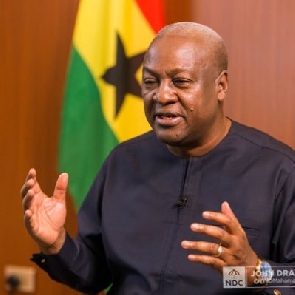Amid the NDC’s opposition to government’s Agyapa Royalties deal, details have emerged of how the NDC proposed a similar deal to Parliament in 2011.
Following the passage of the Minerals Income Investment Fund Act to manage the equity interest in mining companies and also receive royalties on behalf of Ghana, as well as the subsequent establishment of Agyapa Royalties to aid the objective of the Minerals Investment Fund as a special vehicle, the opposition NDC, led by its flagbearer, former President John Mahama and some Civil Society Organisations, have been waging a war against the arrangement to monetize Ghana’s mineral royalties through Agyapa Royalties.
Startling documents have however emerged, showing how the NDC, under the presidency of the late John Evans Atta Mills, with John Dramani Mahama as Vice President, proposed the establishment of a company, Ghana Gold Company, whose objective was similar to the Agyapa Royalties deal, that is to manage Ghana’s gold royalties and also raise private capital for the government in advance against expected royalties.
A memo on October 30, 2011, from a Ghana Gold Committee, established by the then NDC government, to the Parliamentary Select Committee on Finance and the Parliamentary Select Committee on Energy one Mines, asked the two committees to consider the proposal for the establishment of the company to manage Ghana’s equity interest in gold.
Just like Agyapa Royalties is being used as a vehicle by the Ghana Minerals Investment Fund to use Ghana’s minerals royalties as collateral to raise private capital, the NDC similarly proposed to use Ghana Gold Company for Ghana’s gold royalties.
“The Parliamentary Select Committee on Finance and Energy & Mines are being asked to consider the proposal to establish a national vehicle to manage and maximize the financial returns from the country’s interests and royalties from gold companies and mines,” said the 2011 memo to Parliament by the then NDC government.
The memo continued: “currently Ghana has shares and carried interests in a number of mining companies that enable Government to receive significant cash flows from royalties and dividends. The current increase in gold prices, increased demand for gold exposure by investors, and the appreciation in the equity interests in the gold mining companies present a unique opportunity for the government to consider the monetization of all or portion of its gold interests to deliver a significant capital sum to support the nation’s growth and development.”
The NDC government’s memo added: “beginning in the fiscal year 2011 therefore, Government will commence discussions in the establishment of a national vehicle, the Ghana Gold Company (GGC), which will hold the country’s gold royalties and equity interest. The GGC will be a newly incorporated company that will be 100percent owned by the Government and into which the Government will transfer its gold and equity interests. The benefits to Government of having such a company are several, including the following: delivery of significant capital sum to the Government raised from private markets.”
Agyapa Royalties
The Parliament of Ghana passed the Minerals Income Investment Fund Act in 2018 for the management of Ghana’s equity interest mining companies and also receive royalties on behalf of the Government of Ghana.
The Minerals income Investment Fund, which is mandated to invest royalties and revenues it receives on behalf of the government, is also allowed by law to establish Special Purpose Vehicles (SPVs) to help realise its objectives. As a result, the Minerals Investment Fund established a wholly-owned Ghanaian company Agyapa Royalties Limited, which will trade 49% of its shares on Ghana Stock Exchange and the London Stock Exchange, with the Government of Ghana, through the Mineral Income Investment Fund, remaining as a majority shareholder.
In simple terms, Agyapa Royalties is expected to raise fixed money from the private market for the government for development purposes, using Ghana’s commission on mineral royalties as a guarantee.
As the majority shareholder of Agyapa Royalties, Government will also still have a majority stake in all future mineral royalties due shareholders of Agyapa royalties.
Controversy
Despite proposing similar deal in 2011, as revealed by the 2011 memo to Parliament by the then NDC government, the opposition NDC has vehemently opposed the Agyapa arrangement.
The minority walked off during deliberations to approve the deal last month, but a new revelation about how they proposed a similar deal in 2011 would surely raise questions.
General News of Tuesday, 1 September 2020
Source: www.ghanaweb.com

















